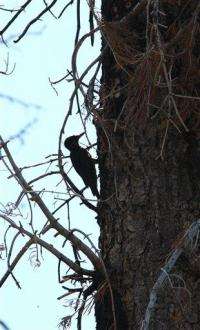Protection sought for rare woodpecker

(AP) -- Smokey Bear has done such a good job stomping out forest fires the past half-century that a woodpecker that's survived for millions of years by eating beetle larvae in burned trees is in danger of going extinct in parts of the West, according to conservationists seeking U.S. protection for the bird.
Four conservation groups filed a petition with the U.S. Interior Department on Wednesday to list the black-backed woodpecker under the Endangered Species Act in the Sierra Nevada, Oregon's Eastern Cascades and the Black Hills of eastern Wyoming and western South Dakota.
It is the first federal petition to recognize the ecological significance and seek protection of post-fire habitat, an expert said.
In addition to fire suppression, the groups contend post-fire salvage logging combined with commercial thinning of green forests is eliminating what little remains of the bird's habitat, mostly in national forests where it has no legal protection, the groups contend.
"Intensely burned forest habitat not only has no legal protection, but standard practice on private and public lands is to actively eliminate it," the petition said. "When fire and insect outbreaks create excellent woodpecker habitat, salvage logging promptly destroys it."
Chad Hanson, executive director the Earth Island's John Muir Project based in Cedar Ridge, Calif., filed the petition Wednesday with the Interior Department's U.S. Fish and Wildlife Service in Sacramento. Co-petitioners are the Center for Biological Diversity based in Tucson, Ariz., the Blue Mountains Biodiversity Project in Fossil, Ore., and the Biodiversity Conservation Alliance in Laramie, Wyo.
Hanson, a wildlife ecologist at the University of California, Davis, said the black-backed woodpecker has been eating beetles in fire-killed stands of conifer forests for millions of years and specifically in North American forests for "many thousand years - since the last Ice Age."
"Now, it's very rare," he said.
The best science suggests there are fewer than 1,000 pairs in Oregon and California, and fewer than 500 pairs in the Black Hills, the petition said.
"Such small populations are at significant risk of extinction, especially when their habitat is mostly unprotected and is currently under threat of destruction and degradation," the document said.
The three-toed, black-backed woodpecker is a specialist at digging out wood-boring insect larvae. The bird's sooty black dorsal plumage serves to camouflage it against the deeply black, charred bark of burned trees.
Richard Hutto, a biology professor and director of the Avian Science Center at the University of Montana, has been doing post-fire research since the early 1990s. He said it would be difficult to find a forest-bird species more restricted to a single vegetation cover type than the black-backed woodpecker is to early post-fire conditions.
Hanson believes the federal petition is the first to seek protection of post-fire habitat and recognize it as "distinct and ecologically significant."
"While it may come as a surprise to some, burned forests, and the dead trees associated with them, are essential to the survival of many wildlife species," said Justin Augustine, a San Francisco-based staff attorney for the Center for Biological Diversity.
Over the past five years, the two have been pressing for protection of the bird primarily through legal challenges to U.S. Forest Service logging projects, primarily in burned forests in the Sierra north and south of Lake Tahoe.
A May 14 hearing is set before the 9th U.S. Circuit Court of Appeals in an ongoing legal battle between the Forest Service and the John Muir Project over salvage logging in woodpecker habitat where 250 homes burned in the 2007 Angora fire at South Lake Tahoe, Calif.
The California State Fish and Game Commission agreed in December to add the woodpecker to the list of species that are candidates for protection under the California Endangered Species Act. State Commissioner Michael Sutton said a two-year review of the bird's status is warranted because some Forest Service plans allow "100 percent salvage logging of burned areas, which is the preferred habitat of this species."
Other subspecies of black-backed woodpeckers live in burned forests stretching along the Canadian border, from Washington state and British Columbia to the Northern Rockies and the northernmost parts of the Upper Midwest and northern New England.
Those birds are "not doing terribly well," Hanson said. But he said they are connected to Canadian boreal forests farther north, whereas the two genetically distinct populations in the Sierra/Cascades and Black Hills are much smaller and "genetically isolated."
©2012 The Associated Press. All rights reserved. This material may not be published, broadcast, rewritten or redistributed.















